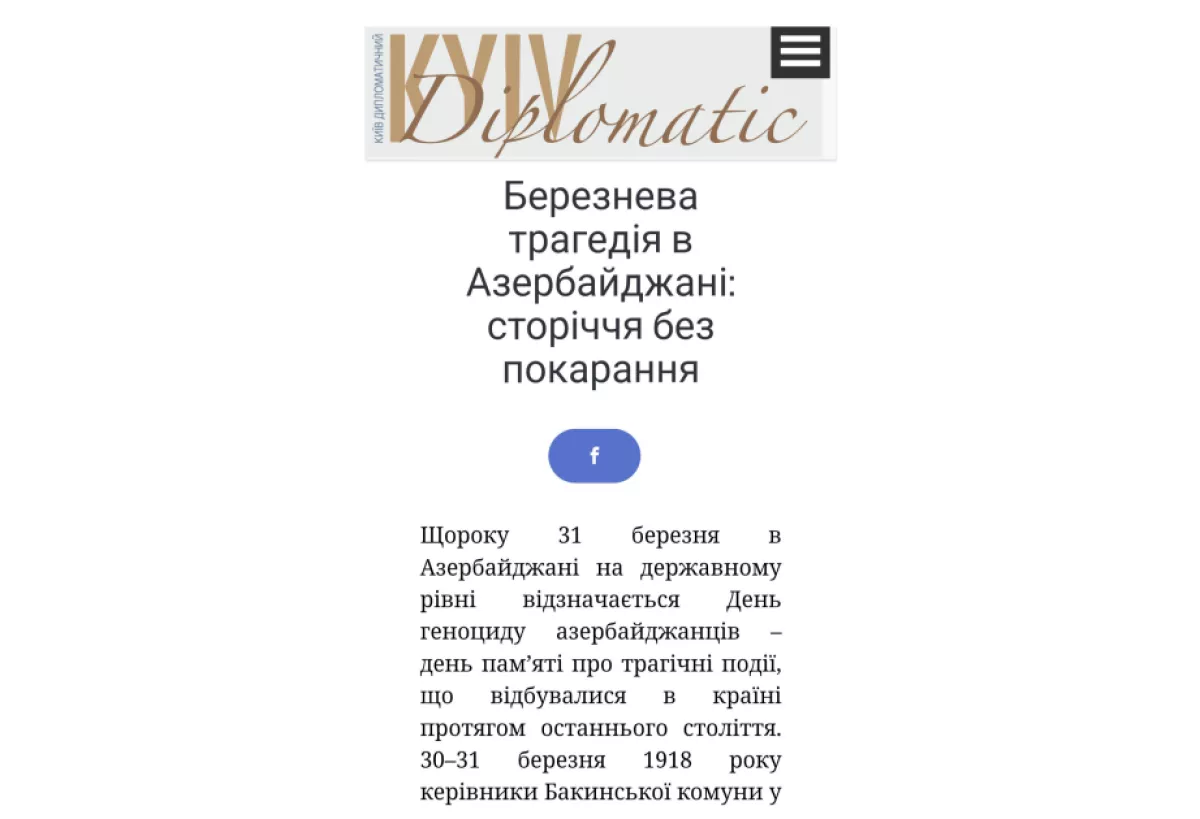Ukrainian journal publishes powerful reflection on Day of Genocide of Azerbaijanis
An article dedicated to March 31 - the Day of the Genocide of Azerbaijanis - has been published in the Ukrainian journal Kyiv Diplomatic, shedding light on the tragic history and ongoing efforts for international recognition.
The piece was written by Arif Guliyev, a distinguished Azerbaijani scholar, doctor of law, professor, diplomat, and academician at the National Academy of Sciences of Ukraine, Caliber.Az reports per local media.
Guliyev, who has been a long-time advocate for shedding light on historical injustices, provides an in-depth analysis of the brutal crimes committed by Armenians and Bolsheviks from March 30 to April 3, 1918.

These events led to the mass killings and suffering of Azerbaijanis in Baku, Guba, Shamakhi, and various other districts of Azerbaijan.
The article underscores the significance of the decree signed by Azerbaijan’s national leader, Heydar Aliyev, on March 26, 1998, officially designating March 31 as the Day of the Genocide of Azerbaijanis. Guliyev also highlights the pivotal role played by incumbent President Ilham Aliyev in bringing international attention to the genocide, especially through diplomatic efforts and advocacy at global forums.
As Azerbaijan marks the 107th anniversary of the tragic events of March 1918, the article emphasises the continued solemn remembrance of the innocent victims who endured genocide, ethnic cleansing, and racial discrimination at the hands of Armenian forces and Bolshevik collaborators. The article also draws attention to the systematic efforts being made to inform the international community about these crimes against humanity, carried out by the Dashnak-Bolshevik armed groups and terrorist organisations during the early 20th century.
March 31 marks the 107th anniversary of the Azerbaijani genocide, one of the first large-scale ethnic cleansings committed by Armenians against the Azerbaijani people. In March 1918, Armenians, with the support of Bolshevik forces, carried out brutal massacres in various parts of Azerbaijan, including Baku, Shamakhi, Quba, Khachmaz, Lankaran, Hajigabul, etc., killing up to 50,000 Azerbaijanis. The violence began during the collapse of Tsarist Russia, when Armenians seized Azerbaijani lands and began exterminating the population of Azerbaijani villages.
This intensified after the October Revolution, when Bolshevik and Armenian Dashnak forces gained control over Baku. In response to these atrocities, the Azerbaijan Democratic Republic created an Extraordinary Commission of Inquiry in 1918, which formally labeled the events as genocide. March 31 was declared a day of national mourning, and the events were brought to international attention.
The tragedy is also linked to the 1992 Khojaly massacre, which mirrored the violence of 1918, further underscoring the long history of suffering endured by the Azerbaijani people. The official remembrance of this genocide was established by President Heydar Aliyev’s decree on March 26, 1998, making March 31 a day to honor the victims and raise awareness of these crimes against humanity.
By Naila Huseynova








